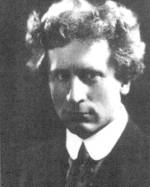 | |||||||

|
Percy Grainger........ a little background information |
|
|
Grainger was born in Melbourne, Australia in 1882 and died in White Plains, New York in 1961. Although he had a huge reputation in his lifetime as a virtuoso pianist and composer of easy listening pieces such as Country Gardens and Molly on the Shore, amongst contemporary music fans, he is often hailed as innovator and wayward genius. He predicted and experimented with many 20th century music concepts before they became known and credited through the work of other composers. For example, Grainger's The Warriors written in 1913 seems to predict Charles Ives with its use of offstage brass band, rhythmic complexities, masses of tuned percussion, use of two conductors and outbursts of spiky dissonance in basically a tonal piece. Random Round, from 1912, anticipates the indeterminate aleatory music of John Cage and Stockhausen (in the piece, musicians are free to start playing when ever they like...not much of a new idea for improvising musicians but for the composed music of the time, quite radical!) Throughout Grainger's whole career, he was busy trying to realise the concept of Free Music; a music free from the tonal or atonal structures of western music. Towards the end of his life, he built (with Burnet Cross) a number of Free Music machines out of industrial waste and junk capable of 'non-harmony' and 'gliding tones'. His first experiments with Beatless Music were started as early as 1899 with his piece The Song of Solomon where the odd time signatures change at every bar. He described the idea as 'music in which no standard duration of beat occurs, but in which all rhythms are free, without beat-cohesion between the various polyphonic parts'. Along with Bela Bartok, Grainger was a pioneer in the recording (on wax cylinders), transcription, promotion and use of Folk music...in particular the native musics of Britain, Scandinavia, New Zealand, Indonesia, Polynesia, Japan and China. A fan of the Player Piano, Grainger also constructed 'unplayable' piano music for the medium prior to the work of Conlon Nancarrow. Grainger was also a pioneer of the 'found object'. For example, a broken cyphering 'C' on his harmonium brought about the piece The Immovable Do in 1933. But it is for his extreme personal behaviour that Grainger is now known. While still alive, he built a museum to himself (Looks like a public toilet) and it is here that 100's of his letters and artifacts enlighten the workings of his mind. Often written in his own language (a made up anglo-saxon, or English without any latin derived words), the letters document his obsessions for physical culture (apart from being a sports fanatic, he would often run from concert to concert); hatred against German hegemony in music; passion for flagellation and sado-masochism (he had a collection of over 70 whips); interest in designing his own clothes made out of towels (he also designed a sports-bra for his girlfriend); unforgivable and often contradictory racist bigotry, particularly against Jews (while at the same time admiring many Jewish musicians); pre-occupation with incest fantasy (although luckily for them, he had no children); obsession with ancient sea-faring nations; love for his mother (suffering from syphilis, she jumped out of a New York sky scraper to her death in 1922); etc, etc. Grainger was a psycho-analysts dream..... or nightmare. A vegetarian, a teetotaler, a non-smoker, a committed atheist, he got married in 1928 to his 'Nordic Princess' Ella Viola Ström in the middle of a concert at the Hollywood Bowl, in front of 15,000 people. Grainger's brain, like classic quantum interference was a crucible of contradictions where phantom or real alternatives could be both child like and monstrous at the same time. His wish for his skeleton to be exhibited in The Grainger Museum was refused on grounds of public decency. His favourite composers? Bach, Duke Ellington and Delius. |
 |
